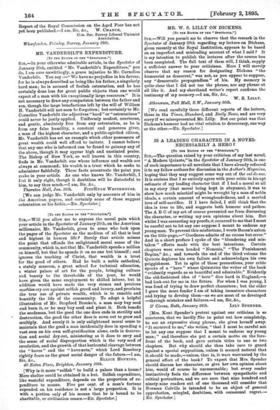IS A LEADING CHARACTER IN A NOVEL. NECESSARILY A HERO
P [To THE EDITOR OF THE "SPECTATOR."] SIR,—The question raised by your criticism of my last nova, " A Modern Quixote," in the Spectator of January 26th, is one of such importance to all novelists that I have already referred it to my fellow authors for discussion in the Author's Magazine, hoping that they may suggest some way out of the cul•de-sac. It is curious that I so entirely agree with your critic in his apt estimate of my leading character that if I had a moral at all in my story (that moral being kept in abeyance), it was to show how much mischief might be wrought by a man of noble ideals, a certain amount of wrongheadedness, and a morbid love of self-sacrifice. If I have failed, I still think that the idea is true to life, and suggests both humour and pathos-. The A B C of my art of course prevented me from discussing the character, or writing my own opinions about him. Bat whilst I was correcting my proofs, it occurred to me that I must be careful not to let any one suppose I meant to endorse my young man. To prevent this misfortune, I wrote Bacon's axiom on the title-page,—" Goodness admits of no excess but error." And in a short preface I spoke of the "blundering and mis- taken" efforts made with the best intentions. Certain chapters were even headed "Nemesis," "The Punishment Begins," &c. ; and towards the end of the third volume the Quixote deplores his own failure and acknowledges his own priggishness. Yet in spite of these precautions, your critic speaks of a " hero " whose Quixotries the writer of the book "evidently regards as so beautiful and admirable." Evidently the old-fashioned idea of " hero " dies hard in England,—a bad look-out for me in the future. For when I was young, I was fond of trying to draw perfect characters ; but the older I grow the more fonder I am of taking immature characters and trying to develop them—as we are most of us developed —through mistakes and failures.—I am, Sir, &c.,
17 Circus, Bath, January 28th. LILY SPENDER.
[Mrs. Kent Spender's protest against our criticism is so courteous, that we hardly like to point out how completely, to use an expressive slang phrase, she gives herself away. "It occurred to me," she writes, " that I must be careful not to let any one suppose that I meant to endorse my young man;" and therefore she put a certain motto on the fore- front of the book, and gave certain titles to one or two chapters. But why should she thus take care to guard against a special supposition, unless it seemed natural that it should be made,—unless, that is, it were warranted by the general effect of the book ? To expect that Mrs. Spender should discuss her character, or give her own opinion about him, would of course be unreasonable ; but every reader instinctively feels the difference between sympathetic and critical portraiture, and we are sure that nine hundred and ninety-nine readers out of one thousand will consider that Norman Colville is intended to be an object of general approbation, mingled, doubtless, with occasional regret.— ED. Spectator.]


































 Previous page
Previous page